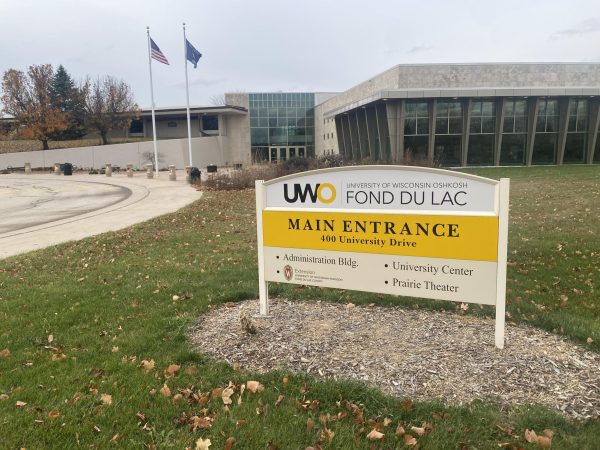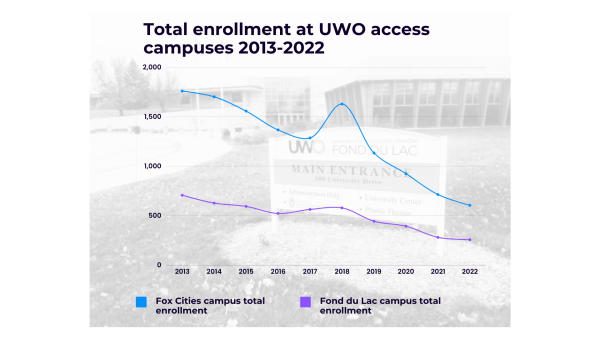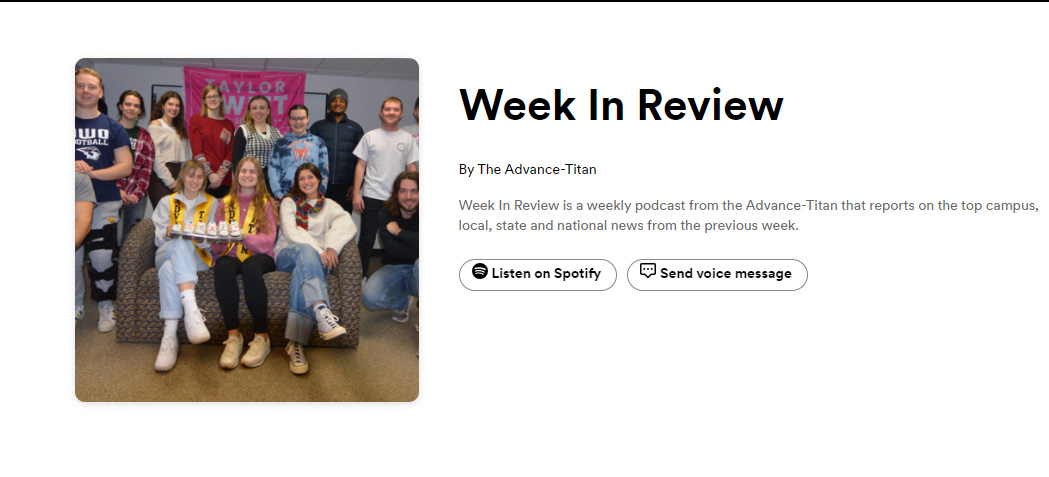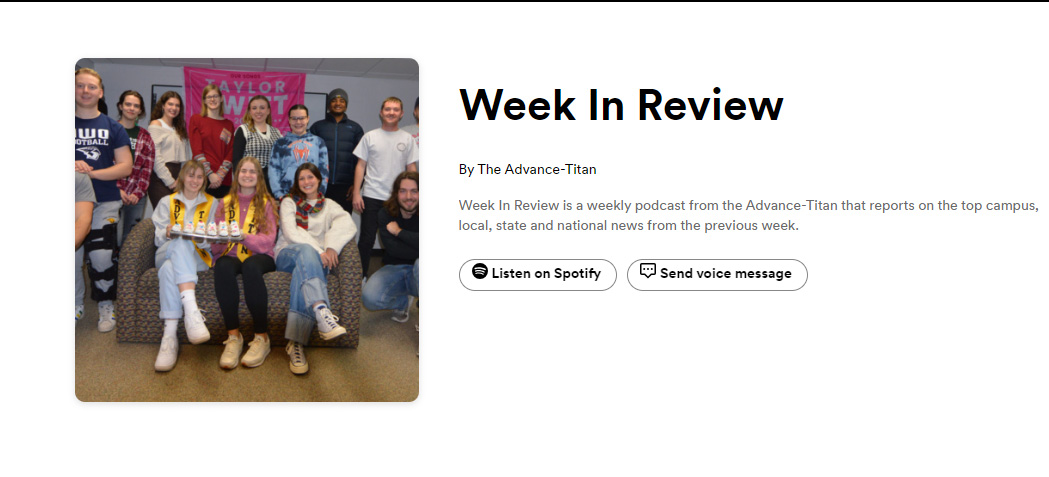Protect our access campuses
By Kelly Hueckman
October 11, 2023

My first day of college, I was convinced I had shown up on the wrong day.
The parking lot was mostly empty, only a few other students were in sight and all of the promotional flyers were dated from the previous year.
Campus was quiet, and that’s how it was every day after at the UW Oshkosh-Fox Cities branch campus.
Granted, this was just after the pandemic lockdown, and many classes were strictly online, but even years later, a ghost school is the reality for many of the Universities of Wisconsin access campuses.
Just 549 students are enrolled at the Fox Cities access campus this fall, down from 1,291 students in 2018. Even more startling? UWO’s Fond du Lac campus hosts just 238 students, down from 499 in the same five-year period.
Such low enrollment numbers forced UW-Platteville at Richland campus to stop offering classes.
Following the cut, University System President Jay Rothman requested financial assessment of all access branches in April leaving students, staff and faculty wondering if their campus is next on the chopping block. This is an especially timely question as the University System faces a $33 million deficit after the 2023 fiscal year.
If they’re struggling so much, why shouldn’t the UW schools cut these campuses? Why spend the money we don’t have to keep them open?
The reality is that access campuses are a saving grace for non-traditional students.
Cutting these programs would be detrimental to people who don’t have the privilege of attending a four-year university. Access campuses allow a wider array of students to get the education they deserve and for many, they are the best available option.
Financial accessibility
Lower costs are one of the biggest reasons incoming students opt to enroll in an access campus, which offer tuition rates as much as $3,000 lower than their parent four-year institutions.
UWO’s Fox Cities and Fond du Lac campuses currently offer in-state tuition of just $5,509 for Fond du Lac and $5,318 for Fox Cities per year, and students can choose to live at home, off campus or on campus.
Meanwhile, UWO’s main campus typically charges $8,258, and lowerclassmen are required to rent an on-campus dorm and purchase a meal plan.
Accounting for these fees, the annual cost rises to nearly $16,000 per year, an unattainable goal for many students.
Access campuses’ lower costs also equal lower risks for students who aren’t quite sure college is for them.
These campuses allow students to get their feet wet in the higher academic world without having to pack up and move away from home, just to find out they wasted tens of thousands of dollars on something they didn’t want to pursue.
Taking away access campuses means taking away access to higher education for many lower-income students. For an institution created to teach, this would be inexcusable and contradict the fundamentals of a liberal education.
Closer to home
Although it was found that 40% of Americans who began college in 2021 moved away from home to do so according to Hireahelper.com, this is not an option for many other students.
Of course, living at home cuts the cost of pricey meal plans and room and board. However, work and/or familial obligations can also influence a student’s decision to enroll in an access campus as opposed to a four-year university.
Nationally recognized college admissions counselor Sara Harberson noted that students can and should even go as far as putting these responsibilities as extracurricular achievements on college applications.
She said she’s worked with students tasked with taking care of children of their own or younger siblings, helping with family-owned businesses and driving elderly family members to doctors appointments.
“Watching over siblings, checking in on grandparents and helping out the family business are just a few things that happen in a day that mean more than a good grade, a big leadership title or even a gold medal,” she wrote in a blog post.
These responsibilities are a major part of many students’ lives, and just because the semester begins doesn’t mean they go away.
Non-traditional and returning students
The college experience is different for everyone, especially non-traditional students.
Non-traditional students can be older than typical college-aged students, have children, be married, commute to school or have previous college experience.
Because these students generally have to balance work, life and school, it’s recommended that they opt for affordable schools with flexible schedules; UW’s branch campuses accomplish this better than other four-year institutions.
While access campuses lack a welcoming environment that main campuses may have, they make up for it by prioritizing low costs and accommodating classes, many of which are available online.
At the Fox Cities campus, it’s rare to find students mingling. Students were there with a commitment to their education without goals of building a social life there; they already had one outside of school.
However, Fox Cities, along with other access campuses, understand the needs of non-traditional students and cater to them.
Branch campuses give non-traditional students an opportunity to learn when a four-year university might not be attainable, and the Universities of Wisconsin should not take this opportunity away.
Fond du Lac campus set to close
By Katie Pulvermacher
October 17, 2023
UW Oshkosh’s access campus in Fond du Lac will discontinue in-person education by June 30, 2024, Chancellor Andrew Leavitt announced Tuesday. This leaves students unsure of where to go next with such short notice.
“Demographic trends, declining enrollments and the rising costs of providing an education continue to challenge us,” Leavitt said. “What is immediately clear is that our focus on supporting UWO Fond du Lac students, their journeys and their success will only intensify. Our commitment is to honor students’ plans and investments as they stand today. Their educational home may change; their tuition will not.”
Fond du Lac’s enrollment was projected to be 243 students this fall, but fell short to 238. Its peak enrollment was in 1975, and the campus is currently at 30% of its Fall 2010 enrollment.

UWO Marketing and Communications Executive Director Peggy Breister said they are not doing further interviews at this time and referred the Advance-Titan to Leavitt’s statement.
In an email from Leavitt in Fall 2022 after the closing of UW-Platteville’s Richland Center access campus, he said UWO remained committed to keeping its Fox Cities and FDL campuses open.
“I want you to know that UW Oshkosh remains committed to the access missions and the continued operation of UWO Fox Cities and UWO Fond du Lac,” Leavitt said. “We do this in collaboration with valued partners and public stewards in Fond du Lac, Outagamie and Winnebago counties. There are no plans or directions to alter course at UWO’s access campuses.”
A year later, with the university in a budget deficit, Leavitt said he received a letter from Universities of Wisconsin President Jay Rothman this week who directed him to discontinue teaching at the FDL campus.
Leavitt, Provost and Vice Chancellor for Academic Affairs Edwin Martini and Chief of Staff Alex Hummel went to the Fond du Lac campus Tuesday morning to tell faculty, staff and students the news.
“According to what the chancellor and provost said, they didn’t find out about this until late yesterday afternoon from President Rothman’s office,” said associate English professor Alayne Peterson, who teaches at the Fond du Lac campus. “Rothman’s office held off on announcing this to let our chancellor do this. We had a two-hours notice. They did what they could.”
Peterson said she usually isn’t on campus Tuesdays and Thursdays due to teaching online classes those days. Same goes for many other staff members. She made it to the meeting in time after a colleague notified her of the email.
“When the provost came to our fall kickoff at the end of August, I asked him point blank if there was a decision that was going to be made (on the future of the Fond du Lac campus), to please tell us face-to-face,” Peterson said. “There’s no good time for bad news. I appreciate them coming down to tell us face-to-face.”
Fond du Lac Student Government Association Public Relations Director Hannah Gruening attended the meeting and felt the announcement was too abrupt.
She said the meeting started with Leavitt, Martini and Hummel expressing their sadness in the passing of Assistant Chancellor for Access Campuses Martin Rudd, who unexpectedly died over the weekend, and then jumped straight into closing the doors at the Fond du Lac campus.
“Our dean passed away unexpectedly this weekend, and then you throw this at us?” Gruening said. “You should’ve waited until next week at least. They just told us what’s going to happen. They had no plan. It’s black and white right now.”
She said the atmosphere in the meeting room was somber.
“A lot of people were hurt,” Gruening said. “I’d say 90% of the room was crying. One hundred percent of the room was upset. They were angry, then they were sad and just disappointed.”
Gruening said she wasn’t born in Fond du Lac, but has lived there most of her life.
“I can’t just pick up my life and move,” Gruening said. “I’m a non-traditional student. I’ve lived here; I have my place. Being able to have this access campus has been able to make my education successful. I’m not sure what my plan is. I think it’s taking it day by day. ”
Gruening said the campus had a preview day for incoming students set to attend in Spring 2024 and Fall 2024 about 30 minutes after the announcement was made.
“What do we tell them?” Gruening said. “The timing is all very poor.”
She said she did appreciate the fact that they came to talk on the matter face-to-face and that the administration said they will honor Fond du Lac’s tuition for the first 60 credits students earn, the equivalent to what they would earn at Fond du Lac, if they choose to transfer to UWO.








